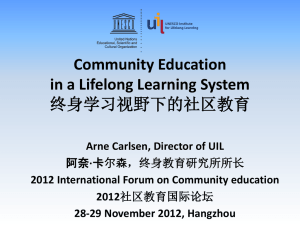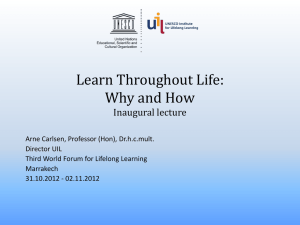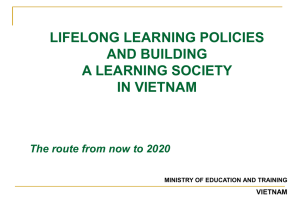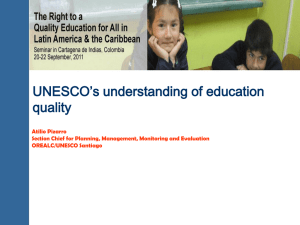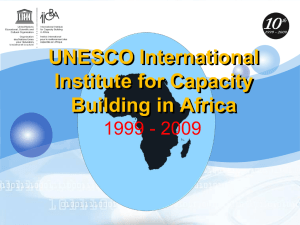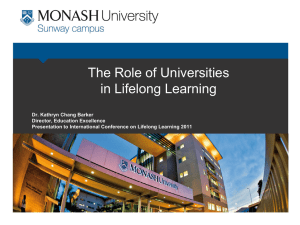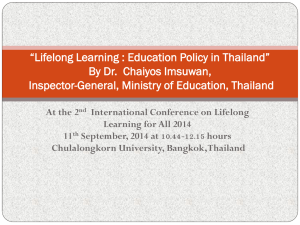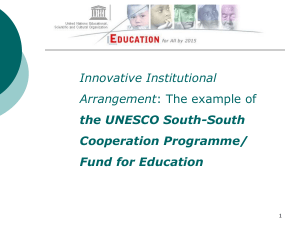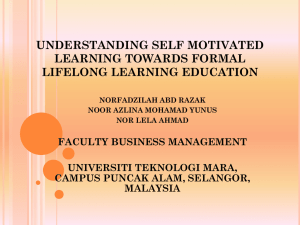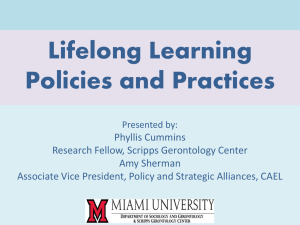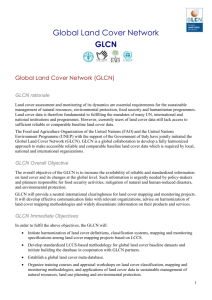卡尔森(Arne Carlsen)
advertisement
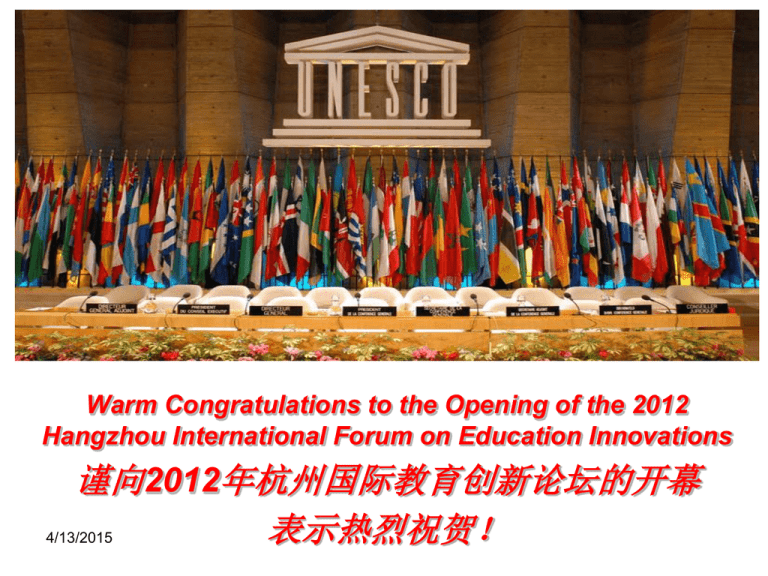
Warm Congratulations to the Opening of the 2012 Hangzhou International Forum on Education Innovations 谨向2012年杭州国际教育创新论坛的开幕 表示热烈祝贺! 4/13/2015 Learning Cities and Lifelong Learning 学习型城市与终身学习 Arne Carlsen, Director of UIL 28 November 2012 联合国教科文组织终身学习研究所所长 阿奈·卡尔森 2012.11.28 4/13/2015 The Faure Report (1972) Learning to Be: The World of Education Today and Tomorrow put forward the learning society concept 福尔报告 (1972) 《 学会生 存:教育世界的今天和明天》提 出“学习型社会”这一概念 4/13/2015 Appealed to UNESCO Member States to re-organise their educational structures on 2 basic premises: 呼吁联合国教科文组织成员国基于两个 基本前提,重新认识其教育体系: All agencies become providers of education 所有机构都成为教育提供者 All citizens be engaged in learning, taking full advantages of the opportunities provided by the learning society 所有公民都参与到学习中来,充分利用学 习型社会提供的学习机会 4/13/2015 Delors Report: Learning: The Treasure Within (1996) 德洛尔报告:《学习:内在的财富 》(1996) 4/13/2015 • The concept of learning throughout life leads straight on to that of a learning society which offers many and varied opportunities of learning, both at school and in economic, social and cultural life • “终身学习”这一概念直接指向的是一个能够提供大量和多样学习 机会的学习型社会,这些机会不仅存在于学校,同样在于经济、社 会和文化生活中 • More collaboration and partnerships with families, industry and business, voluntary associations, people active in cultural life, etc • 与家庭、企业、志愿团体及文化生活热心参与者建立更广泛的合作 和更良好的伙伴关系 4/13/2015 Lifelong learning for all 终身学习,全民参与 UNESCO believes that advancing towards lifelong learning for all implies moving towards a ‘learning society’ in which each person is a ‘learner’ and at the same time a ‘source of learning’ and in which each individual will have the opportunity to learn what s/he wants when s/he wants 联合国教科文组织认为,推行“终身学 习,全民参与”意味着建立一个“学习 型社会”,在这个社会中,每个人在作 为“学习者”的同时,也是一个“学习 资源”,每个人在渴望学习时都能够学 到他(她)所想要学习的内容。 4/13/2015 Some basic conclusions drawn from previous research 从研究中得出的基本结论 The discourse of ‘lifelong learning’ as a ‘master concept for educational policies’ has been widely accepted; “终身学习”的提法作为“教育政策的核心 概念”已被广泛接受; 4/13/2015 Some pragmatic approaches have been adopted to make the visionary discourse of lifelong learning ‘handle-able’; 已经采用一些务实的方法,使终身学习这一理念变 得较为切合实际; A learning society in a country can only be built province by province, city by city, community by community. 一个国家的学习型社会建设,只能一个社区一个社 区、一个城市一个城市、一个省一个省地循序渐进 。 4/13/2015 The building of a learning region/area is one of the practical or operational approaches; 实际操作方法之一是学习型地区/区域建设 The concept of a learning region/area can apply at all levels of local government, the main focus tends to be on cities 学习型地区/区域的概念适用于任何类别的地方政府,而 主要焦点在于城市 4/13/2015 Why cities? 为什么选择城市? Cities offer a more favourable setting to solve social and environmental problems 城市具备更好的解决社会和环境问题的条件 Cities generate jobs and income 城市提供就业和收入 Cities could deliver education, health care and other services more efficiently 城市拥有更高效的教育、医疗和其他服务 Cities present opportunities for social mobilisation and women’s empowerment 城市提供社会流动性和妇女权益的机会 4/13/2015 Urban and rural population of the world, 1950 - 2030 Source: UN Population Division. 4/13/2015 世界城乡人口变化图(1950-2030) 来源:联合国人口司 http://cdnimg.visualizeus.com/thumbs/8c/ec/chart,people,population,rural,urban,cities8cec9968e4bf76de910f891ff9ab45d9_h.jpg 4/13/2015 http://enterpriseresilienceblog.typepad.com/.a/6a00d8341c4ebd53ef01538ed7ee6e970b-popup 4/13/2015 The McKinsey Global Institute estimates that in India, cities will provide the overwhelming share of economic growth (70%), new jobs (70%), and tax revenues (85%) by 2030. 麦肯锡全球研究所估算,到2030年,印度城市将 贡献绝大多数的经济增长(占70%)、新就业机 会(占70%)和税收(占85%)。 4/13/2015 http://waldokrugell.blogspot.de/2012/04/few-good-posts-new-cities-place.html 4/13/2015 Why learning? 为什么要学习? Cities with better-educated individuals have stronger economies; 个人受教育程度更高的城市,经济更发达; In term of social inclusion or exclusion and learning, lower educational levels are associated, with unemployment; 在社会融入、社会排外和学习的关系方面, 教育水平低下常与失业有关; 4/13/2015 Learning is critically important in a city’s efforts to attract and retain skilled and diverse workers; 学习对于一个城市吸引和留住人才至关重要; Learning is crucial to improve the quality of life; 学习对于提高生活品质至关重要; Cities in a globalised world cannot afford not to become learning cities (Longworth, 2010); 在全球化的世界中,城市必须发展为学习型(朗 沃斯 2010) 4/13/2015 Examples of learning cities around the world 世界各地学习型城市的样本 More than 1000 cities in the world have already become or are building Learning/Educating cities. 全世界超过1000座城市已经建成或正在建设 学习型/教育型城市 The building of Learning/Educating Cities has become a considerable world-wide phenomenon. 学习型/教育型城市建设已在全世界范围内变 得日益重要。 4/13/2015 In 1990s, implement the European Lifelong Learning Initiative (ELLI) 九十年代实施“欧洲终身学习 计划” In1998,started to promote Towards a European Learning Society (TELS) 1998年,开始实施“建设欧洲学 习型社会”项目 United Kingdom • In 1996, Liverpool declared itself to be a ‘City of Learning’ and the UK Learning Cities Network (LCN) was established. Now, LCN has 80 member cities and regions. • 英国:1996年,利物浦率先宣布 其为“学习的城市”,当年英国 建立学习型城市网络,共吸纳80 个成员单位。 Germany • The national programme ‘Learning Regions Providing Support for Networks’ was launched in 2001, which supported some 70 regions. • 德国:2001年建立国家“ 学习区域:为提供支持建 立网络”项目,共支持70 个区域。 4/13/2015 Canada 加拿大 In 2003, Victoria set a goal of being a “leading learning community” by 2020. Vancouver aims to be a Learning City. St. John’s and Edmonton have made efforts to become learning communities. 2003年,维多利亚提出了2020 年建成“领先的学习型社区”的 目标。温哥华计划建设成为学习 型城市。 圣约翰和埃德蒙顿正 在努力建设学习型社区。 4/13/2015 Australia 澳大利亚 Every state has its own government inspired and funded learning cities association. In Victoria, for example, all municipalities of more than 5,000 people are expected to belong to this and to pursue learning city policies. 每个国家 都拥有由政府主导建立和资助的学习型城市机构。例如,在 澳大利亚的维多利亚州,所有人口5000以上的城镇都属于该 机构,并实施学习型城市政策。 4/13/2015 Japan 日本 In as early as 1979, the city of Kakegawa was declared the first Lifelong Learning City in Japan. Since then, the Japanese lifelong learning city project has been implemented as part of the policy for promoting lifelong learning by city/town/community units.早在1979年,挂川市 就宣布成为日本第一座终身学习型城市。此后,日本终身学 习型城市建设工程就成为了推行终身学习政策的一部分,这 一政策以城市、乡镇、社区为单位实施。 4/13/2015 Republic of Korea 韩国 The Lifelong Education Law was enacted in 1999, which states that “government can designate and support selected municipalities, districts, and counties as lifelong learning cities”. In 2012, a total of 80 local governments were designated as ‘Lifelong Learning Cities’. 1999年韩国政府颁布实施 了《终身教育法》, 规定“政府可 以有选择地指定和支持市、区和郡 成为终身学习型城市”。至2012年 ,已有共计80座城市成为“终身学 习型城市”。 4/13/2015 South Africa 南非 In 2001, the Western Cape, one of the nine provinces in South Africa, started the ‘Learning Cape’ framework as one of the four key pillars for economic and social development. 2001年,南非九省之一的西开普省开展“学习型开普”项目 ,该项目是该省经济和社会发展四大重点支柱项目之一。 4/13/2015 China 中国 During 2002-2005, the city of Beijing participated in the EU funded PALLACE project. In October 2011, more than 210 cities (districts and counties) in China organised the lifelong learning activities week, many of them have set up the goal for constructing learning cities. 2002-2005年期间,北京市参与了由 欧盟资助的PALLACE工程。2012年 10月,中国超过500个城市/地方举办 了终身学习活动周,其中许多城市确 立了建设学习型城市的目标。 4/13/2015 Viet Nam 越南 The national steering committee for building a learning society is in the process to develop the “National Scheme on Building a Learning Society in Viet Nam (2011 – 2020)” which proposes an initiative to pilot the building of learning provinces, learning cities, learning districts and learning communities.越南全国建设 学习型社会指导委员会正在制订《国 家建设越南学习型社会的规划纲要( 2011-2020年)》,该纲要计划采取 初步行动以指导学习型省份、学习型 城市、学习型地区和学习型社区建设 。 4/13/2015 Definition of a learning city 学习型城市的定义 A Learning City is one which invests in quality lifelong learning for all in order to: 学习型城市致力于为所有人提供高品质的终身学习,其目的在于: •Promote inclusive learning from basic to higher education •提供从基础教育到高等教育的包罗广泛的学习机会 •Invest in the sustainable growth of its workplaces, •促进就业机会的可持续增长 •Re-vitalise the vibrant energy of its communities, •重新激发其社区的充沛能量 •Nurture a culture of learning throughout life, •培育终身学习的文化氛围 •Exploit the value of local, regional and international partnerships, and •利用当地、地区性和国际伙伴关系的的价值,以及 •Guarantee the fulfillment of its environmental obligations. •保证履行其环境义务 4/13/2015 In so doing it will release the strength and capacity of all its resources for creating individual empowerment and cultural prosperity, social cohesion and economic prosperity, and sustainable development. 采取这些措施,将能够充分利用城市的所有资源,以保障个 人权益,促进文化繁荣,增强社会凝聚,推动经济发展,实 现可持续发展。 4/13/2015 UNESCO Initiative 联合国教科文组织的初步行动 In response to Member States’ call to adopt a more pragmatic and instrumental approach to promoting lifelong learning, UNESCO/UIL plans to establish: 为了响应成员国采取更加切实有效的措施,以推进终身学习发展的呼声,联 合国教科文组织计划建立: UNESCO Global Learning Cities Network 联合国教科文组织全球学习型城市体系 UNESCO GLCN With its Secretariat at the UNESCO Institute for Lifelong learning 秘书处设在联合国教科文组织终身学习研究所 4/13/2015 Overall aim UNESCO GLCN 体系的总体目标 To create a global platform to mobilise cities and demonstrate how to use effectively their resources in every sector to develop and enrich all their human potential to foster lifelong learning for all, to develop equality and social justice, to maintain harmonious social cohesion, and to create sustainable prosperity. 建立一个全球性平台,以动员世界各地的城市,展示如何 有效利用各地资源,以开发和强化其自身的潜能,推动建 立终身学习机制,促进社会公平和正义,保持社会和谐和 凝聚力,确保长久繁荣。 4/13/2015 Objectives of UNESCO GLCN Objectives 建设学习型城市网络的目的 • Advocate lifelong learning for all; 倡导全民终身学习 • Facilitate research; 促进学习型城市研究 • Promote policy dialogue and peer learning; 促进政 策对话和伙伴学习 • Serve as a clearing-house; 发挥资料收集和分享作用 • Provide capacity development; 提供能力建设 • Develop a Global Learning City Index; 开发指标体系 • Monitor the implementation of the Index. 4/13/2015 监测指标体系的实施情况 CHINA International Consultative Meeting for Establishing the UNESCO GLCN Objectives: 会议目的 •To review progress made; 回顾进展情况 •To clarify the objectives and functions; 明确目标和功能 •To develop a road map;制订路线图 •To validate UNESCO GLCN index; 讨论学习型城市指标体 系 •To elaborate the theme of the 1st Conference of the UNESCO GLCN, to be held in Beijing in autumn 2013. •明确2013年秋季在北京召开的全球学习型城市大会的主题 4/13/2015 Thank you very much for your kind attention 谢谢! a.carlsen@unesco.org a.carlsen@unesco.org 4/13/2015
